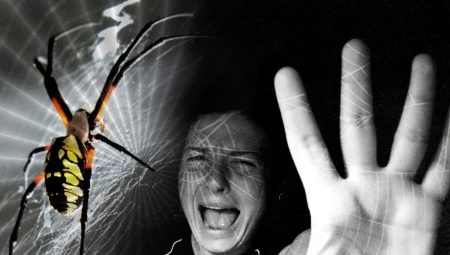Phobia of insects is one of the most common in the modern world. Probably each of us is a little afraid of insects and dislikes them. This is normal: fear is considered a phobia only in those cases when it is uncontrolled and intrusive. Fear of insects is called insectophobia, however, it can be divided into smaller subspecies. In this article we will consider options for fear of insects, possible causes and methods of treatment.
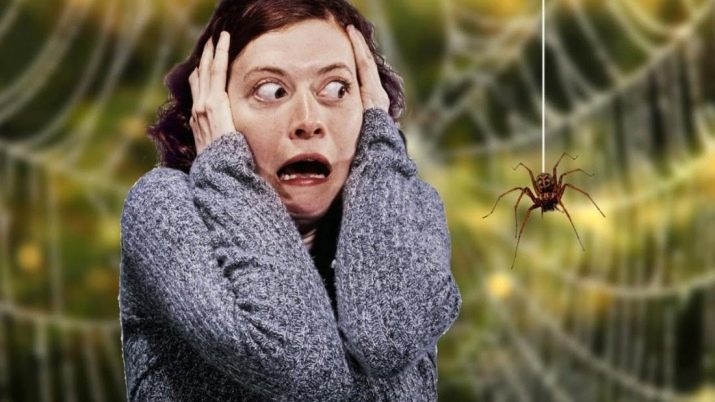
Description of the phobia and its subspecies
Many people believe that we inherited the fear of insects from our ancestors, because some of them really always posed a danger to humans and were carriers of various diseases. Insectophobia is typical for many at the present time. Many are afraid of all insects, for someone the object of a phobia is only flying arthropods. Some are afraid of specific types: cockroaches, earthworms, bees, ants, wasps, bugs, flies, caterpillars and moths can cause fear. Sometimes people are even afraid of butterflies, which for the majority seem completely harmless creatures.
The fear of insects in various sources is called entomophobia or insectophobia. Adults, and children, and men, and women are equally inclined to it. Different types of fear of insects have their name. Consider the most common options.
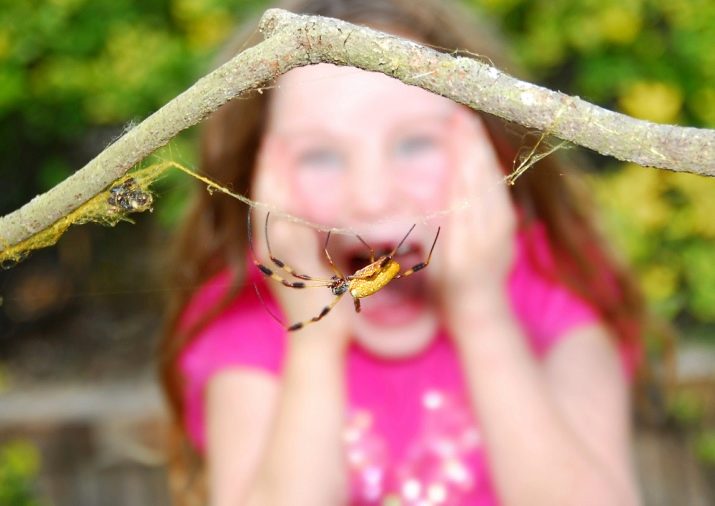
Acaraphobia
Residents of mid-latitudes often have acaraphobia, or fear of ticks. Fear has a reason, because it is really difficult to notice a tick, and the risk of getting seriously ill is very high. Nonetheless, in acarophobia, prudent caution goes into uncontrolled panic. A person avoids any forests and parks, uses repellents excessively and constantly checks his body to make sure there are no ticks. Often the trigger for such a phobia is an unpleasant incident with tick bites from close friends, especially impressionable people may begin to be afraid after the release of tick news.
In the early stages, fear can be dealt with independently, but as the phobia progresses, only a qualified professional can help.
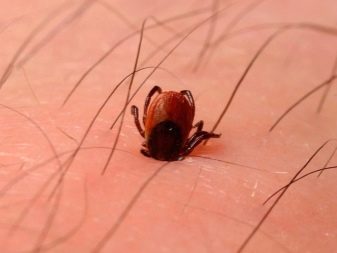
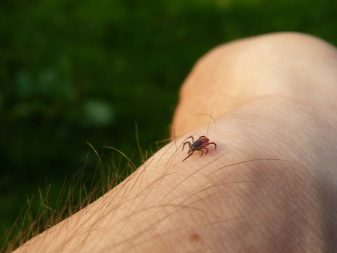
Apiophobia
This is a fear of bees, which is very common in children and sometimes occurs in adults. Many of us have been bitten by bees at least once in our lives, but people with phobias experience real panic attacks when they think about them. Increased heart rate, uneven breathing, sweating and uncontrolled movements are signs of a real phobia. The disease is a serious discomfort, as bees surround us everywhere. To cope with phobia, they recommend various methods of relaxation, natural sedatives, and in advanced cases, a qualified psychotherapist should be consulted.
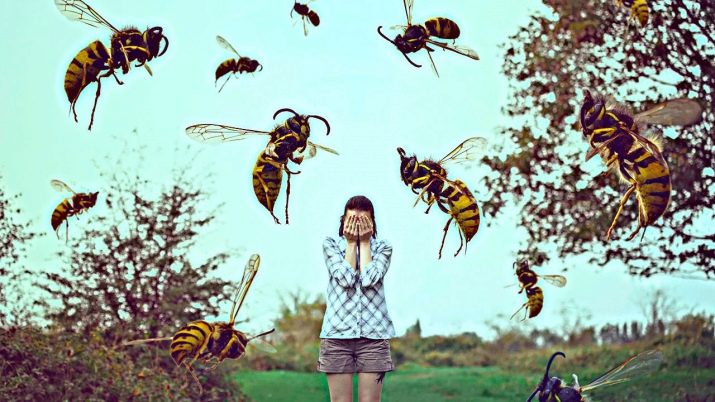
Arachnophobia
Biologists do not consider spiders to be insects, but for human perception they are approximately equivalent, in addition, fear of spiders or arachnophobia is very common in conjunction with other fears of insects. It is worth noting that most spiders are harmless to humans, so the phobia is not so much the fear of harmhow much in hostility and causeless uncontrolled fear. Living with such a phobia is quite difficult, because a spider can meet a person even indoors.
In order to correctly cure a phobia, you need to carefully understand its causes - this can be done by a person himself with the support of loved ones or consult a psychologist. The main thing is not to let the disease drift.
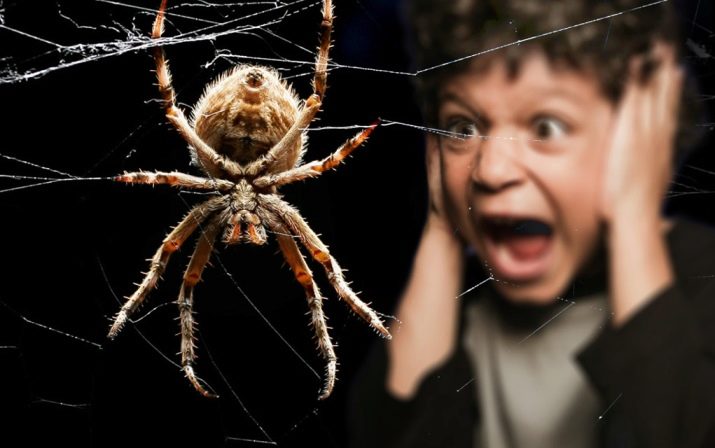
Dipterophobia
Fear of flies is often associated with a fear of dirt that they carry. Nevertheless, a disorder is called a phobia when a reasonable cleanliness becomes a real pathology. Fear of flies is more common in women than in men. It significantly reduces the quality of life, to the extreme extent it motivates a person to close windows tightly and almost never leave home in the warm season. Of course, it is important to fight this phobia - for proper treatment you need to find out the specific reasons and realize that fear is unfounded.
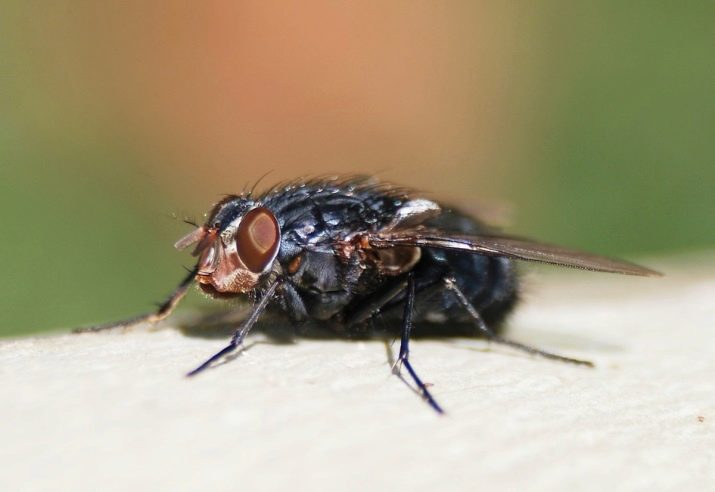
Isopterophobia
A very exotic disorder, which is quite rare. This is the fear of termites and other insects that feed on tree bark. Psychologists still have no consensus on why this phobia appears: the motives for such a fear are very specific, individual and associated with childhood injuries. It is more difficult to treat such a phobia, because it is atypical and highly dependent on the personal experience of the patient. It is very important to find out the true motives in order to get rid of fear once and for all.
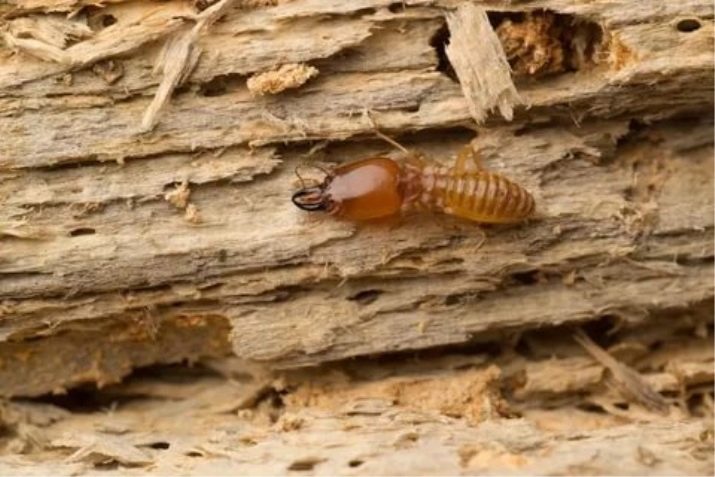
Knidophobia
This is a fear of all stinging insects. Each of us was bitten by wasps, bees, mosquitoes and horseflies, but people suffering from phobia experience serious discomfort, horror and real panic attacks when thinking about these insects. Increased pressure, uneven breathing, trembling, cramps, excessive sweating and uncontrolled movements are signs of a real phobia, which can occur with contact with insects, and even without them. The disease causes serious discomfort, since it is difficult to completely isolate from stinging insects.
To cope with a phobia, they recommend breathing exercises, various methods of sedation, and if you can’t overcome fear yourself, the help of a qualified psychotherapist is important.
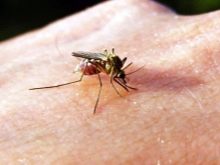
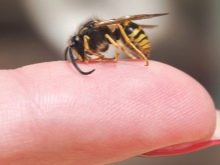

Mirmecophobia
This is a fear of ants, and it occurs quite often. Many children have at least once stepped foot in the anthill and experienced bites of many small insects - This is a very unpleasant experience, because it is completely impossible to control many small ants. From this, a person experiences panic and a feeling of utter helplessness. In severe cases, unpleasant fear develops into a phobia, which interferes with life. Even one ant running past can cause an adrenaline rush, uncontrolled actions, and even physical pain. And stressful conditions, in turn, lead to somatic diseases over time. With the phobia of ants, like with other phobias, it is worth fighting as early as possible.
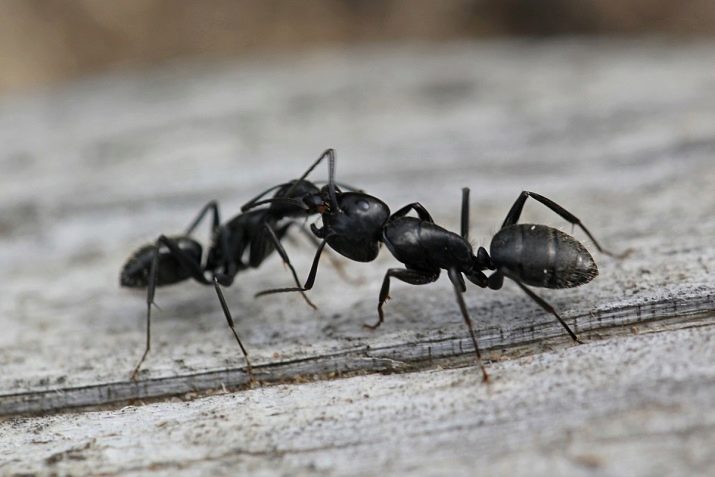
Scoleciphobia
Obsessive fear of worms and larvae. Fear seems justified: most people have a real aversion to these insects. However, phobia is relatively rare - it implies panic attacks and obsessive thoughts when in contact with worms and at their sight, although, in fact, most of these insects do not pose a threat to humans. Sometimes a phobia is caused by adverse environmental factors, and sometimes there is a hereditary predisposition - for example, severe disgust.
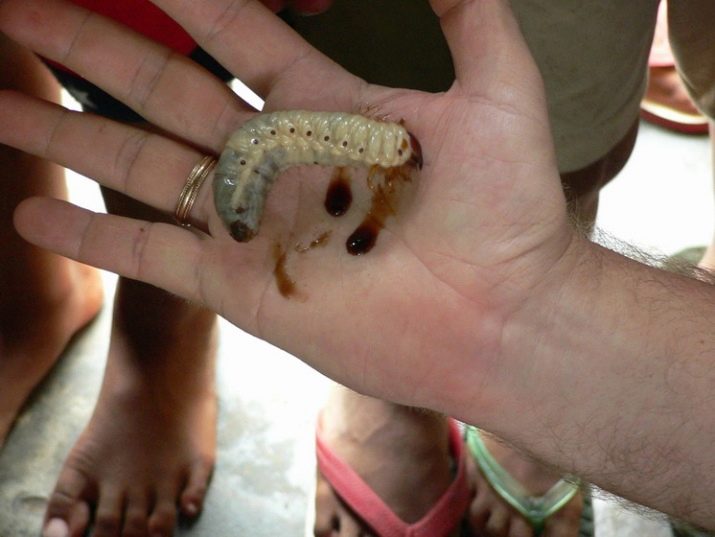
Lepidopterophobia
One of the very rare and mysterious pathologies, which is the fear of butterflies. Most people find these creatures quite enjoyable and not at all dangerous: many caught butterflies in childhood or visited special breeding sites in botanical gardens. However, sometimes this phobia occurs in combination with other obsessive fears of insects, and sometimes it happens on its own. Usually it is associated with injuries due to which a person’s butterflies give rise to a complex negative association. If a person suffering from such a phobia cannot tell himself the reasons for his fear, it is better to seek qualified help.
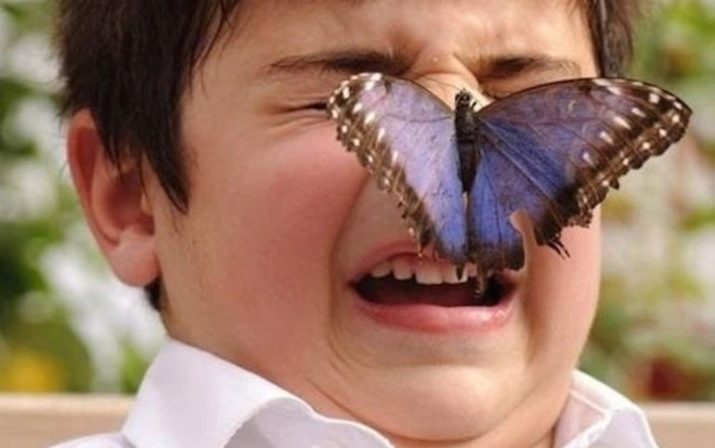
Where does the fear of insects come from?
The causes of fear of insects are very individual: some fear suddenly appear in adulthood, while others have been afraid of insects since childhood. In general, psychologists identify external and internal causes that provoke the development of phobias. Often these reasons act together, but a good specialist will help highlight the main thing - you need to fight not with the phobia itself, but with those motives that make a person afraid.

Consider the internal causes of phobia.
- Heredity can make one person more likely to acquire insectophobia than another. The personality traits and character traits that are genetically embedded in us play a role: disgust, sensitivity, an acute perception of pain or the desire to control everything around can become the basis for the emergence of insect phobia. However, these symptoms alone do not guarantee phobia - they only increase the risk of developing the disease with the combined action of adverse external factors.
- Traumatic brain injuries sometimes also lead to phobias. If certain parts of the brain are damaged, a person becomes more susceptible to obsessive fears.
- Neurosis and psychosis often entail a bouquet of all kinds of phobias, often including an insect phobia. Due to such mental disorders, the emotional state of a person as a whole becomes more unstable. Therefore, he is prone to an acute reaction to various factors, can fall into panic attacks and get hung up on certain things, as an object of fear.
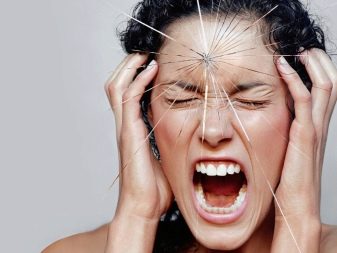

Among the external causes of phobias are all kinds of adverse environmental influences, injuries in childhood and adulthood. Usually they become the “trigger” for the development of a phobia. Perhaps a person in childhood survived the attack of wasps, was locked up with cockroaches, or read a terrible tale of a spider.
Perhaps the adult has lost a loved one from being infected with a tick, and now he is panicky afraid of any thickets. One way or another, it is necessary to work with the reasons in order to overcome the phobia. You can try to cope with fear on your own, but it is better to contact a professional.
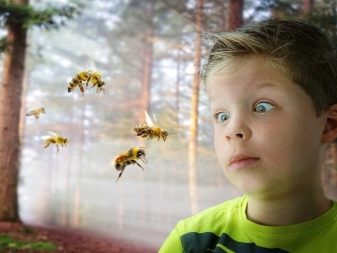
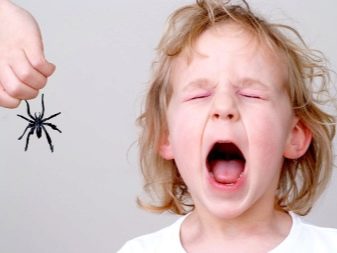
How is insectophobia manifested?
It is important to distinguish a phobia from ordinary fear, which each of us is subject to to some extent. Observe the following symptoms of insectophobia.
- Panic attacks are one of the surest signs of a real phobia. Moreover, they can occur even not only in contact with insects, but when they are mentioned, as well as when walking in places where you can potentially encounter them.
- Increased pressure and increased heart rate indicates a strong fear, this is due to the release of adrenaline into the blood.
- Goosebumps, trembling and small uncontrolled movements can also produce insectophobia. In times of intense fear, a person literally does not control himself: he can either contract and squeeze his whole eyes or start waving and screaming.
- Dizziness and inability to stand on legs also indicate severe stress. Often at the time of experiencing fear, an insectophobe will try to lean on something or sit on the ground. In some cases, fainting is possible.
- Sometimes phobia is accompanied by convulsions and uncontrolled muscle contraction. This can lead to various pinches.
- In the extreme stages of a phobia, fear is accompanied by physical symptoms - for example, a person may experience real pain.
- Often, phobia is accompanied by disorders of the gastrointestinal tract, diarrhea, flatulence, and abdominal pain.
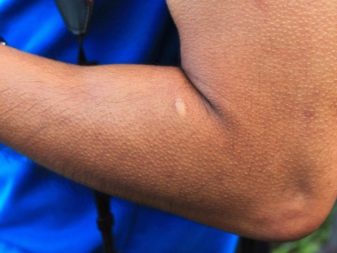

Some of these manifestations are clearly visible externally, while others can only be evaluated by the person himself. It's obvious that phobia - something more powerful than just household fear. It covers the whole person and determines not only psychological health, but also physical well-being. With chronic stress on the basis of phobias, various diseases can develop - from dermatitis to heart diseases.
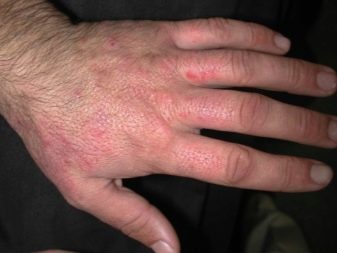

Methods of struggle
In the modern world, there are many ways to get rid of a phobia, it is only important to diagnose it correctly and not delay in solving the problem. If the symptoms do not bother you very much, and you don’t want to see a doctor for one reason or another, psychologists recommend the following measures for independent struggle with obsessive fear.
- Meditation and yoga help you to come into harmony with yourself, gather your thoughts, make friends with your body. Correct exercises help to strengthen general calm and get rid of obsessive thoughts - try to devote meditation at least a few minutes daily.
- Breathing exercises also important for relaxation and calm. Train every day, and at the moment of collision with an insect try not to give in to panic, but to breathe deeply and rhythmically.
- Massage can also help. You can resemble individual sessions in the spa or simply ask a loved one to massage your shoulders while walking in the forest. Stress provokes muscle clamps that need to be removed.
- Healthy eating helps to strengthen not only physical but also mental health, so psychologists recommend that you monitor what you eat.
- A lot of adrenaline is produced during fear - You can reset it with the help of sports exercises. In addition, during intense training, the hormone of joy produced endorphin, which will also help fight stress.
- Try soft soothing teas: mint, lemon balm and valerian will help to calm down a bit, and will become a pleasant habit for every evening.



If the phobia is strong, and you can’t cope on your own, you need to contact a specialist. The goal is to understand the cause of your uncontrollable fear and fight it. Individual conversations with a good psychologist sometimes help. Group therapy gives good results: you will see that you are not alone in your problem, and you can help each other overcome fear. Also, in the fight against phobias, hypnosis techniques are often used - the patient is given the correct settings that help to overcome fear.
In extreme cases, medications are prescribed to treat insect phobia. It can be antidepressants, sedatives or hormones. You do not need to take them yourself without consulting a doctor - limit yourself to natural remedies.

